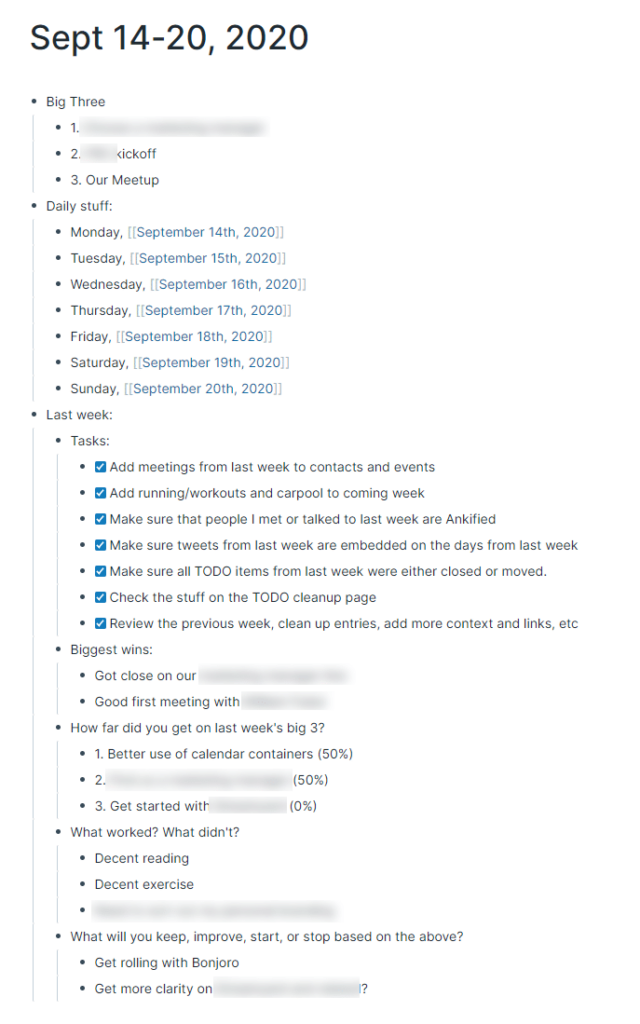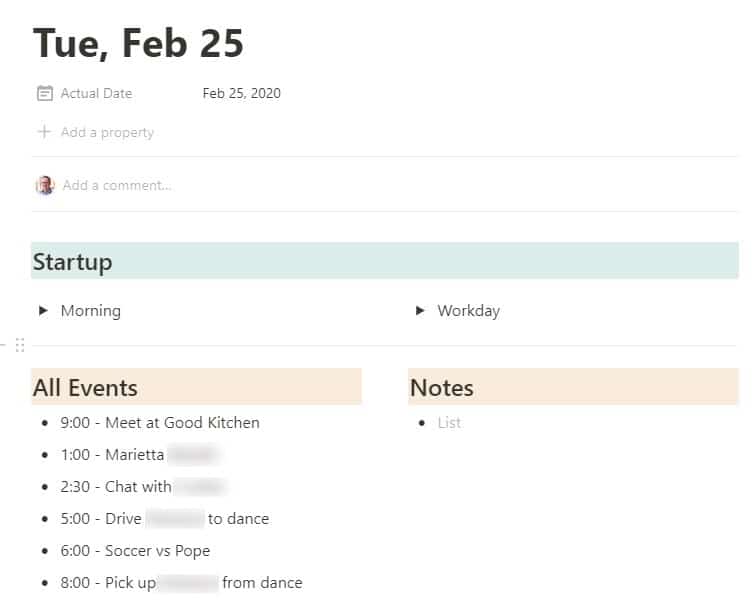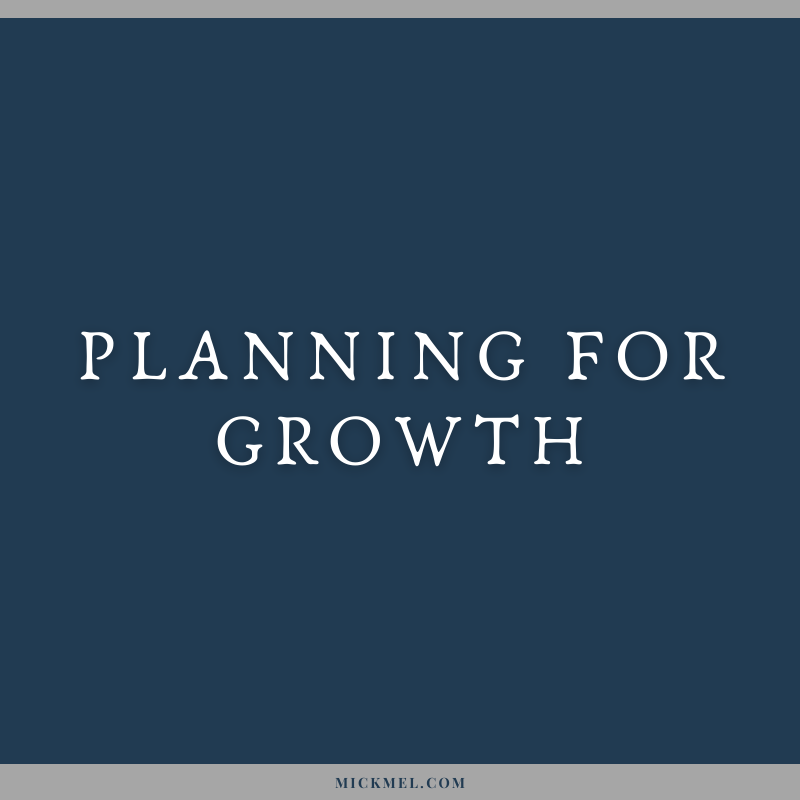I’ve always considered myself to be a pretty good planner, but as I’ve learned more I’ve realized how poor a job I often do. Over the past year, I’ve refined my processes quite a bit and I feel I have things in a much better place (though always looking to improve).
For me, planning really consists of two pieces:
- Planning for the day/week/quarter/year ahead.
- Keeping a rough log of what happens so I can use that knowledge going forward.
Planning Ahead
There are a lot of tools out there on goal setting, so we won’t be digging too deeply into that. A good place to start would be books such as “Your Best Year Ever” by Michael Hyatt for help in that area. In terms of goals, I see it essentially like this.
You should have roughly 100 lifetime goals, worked into 10-12 goals each year, perhaps 3 goals each quarter, and then a “big three” each week and each day that point toward those goals. Those daily and weekly big three don’t always point toward your quarterly goals, but should be set with those in mind.
My yearly planning and quarterly planning are similar, where I look at my overall goals and try to plot things out. The weekly and daily planning are where things get tactically useful for you.
Be SMART
This article isn’t about goal setting, but it’s worth touching on how goals should be developed. Ideally your goals should be “SMART”, using the framework that George Doran came up with decades ago.
- Specific: What exactly are you trying to do? “Get more fit” is not a goal, but “lose 20 pounds” works much better.
- Measurable: How will you measure what you are doing? Using the example above the “20 pounds” is a very easy metric to track.
- Attainable: To lose your weight, you might set a goal to run 10 miles every day. That’s specific and measurable, but not likely attainable. Setting goals that are attainable is important. Don’t make them easy, but don’t put them too far out of reach.
- Relevant: Make sure your goals are relevant to your bigger life plans. A goal might be to complete an Ironman triathlon, but if you don’t have the time or desire to work out that frequently, it will be a difficult goal to attain.
- Timely: Your goals need a timeline. “Lose 20 pounds” is a good goal, but with no backstop you’re never really behind. “Lose 20 pounds by May 1” sets some guidelines and you can do the math on how to get there.
So if one of your annual goals is to lose 20 pounds, you need to work that into your quarterly goals. Those could be weight measurements, or just activities. For example, your goal for the quarter might be “Go outside and walk at least one mile three times per week”. That’s specific, measurable, attainable, relevant, and timely.
As you get into your weekly and daily goals, those walks can be part of what you need to do.
Weekly Planning
Much of what I do each week is based on concepts from Michael Hyatt’s “Full Focus Planner”. It’s an excellent paper planner, and really shaped how I handle my weekly planning.
While I no longer use the paper planner (I went back to digital), the lessons from it were invaluable.
People generally work through their weekly planning on Friday afternoon, over the weekend, or on Monday morning. I do mine on Friday afternoons for two big reasons:
- If you get it out of the way on Friday, your head will be a bit more clear on the weekend knowing that next week is already firmed up.
- If you are confirming meetings for the following week, people are likely to respond on Friday afternoons, but not on Sunday evenings.
Here is an example of how that looks in Roam Research:

No matter what tool I use, the basic content is always essentially the same:
- Work through the “Big Three” goals for the upcoming week.
- Go through each day of the week individually, which we’ll discuss in the next section.
- Add other tasks for the week, such as workouts, car pool, food planning, etc.
- Look at wins from the past week.
- Ask a few other questions such as:
- “What worked and what didn’t?”
- “What will you keep, improve, start or stop based on the above?”
I find this 60 minutes each Friday to be some of the most valuable time of the week, as it keeps me focused on my goals, prepared for the week ahead, and cognizant of what happened the previous week.
Daily Planning
My daily planning really consists of two areas. The main one is filling in the scheduled events, for things that I know are coming (meetings, etc). Equally important, though, is tracking the unscheduled events that pop up each day.
Scheduled Events
As part of my weekly planning I look at each individual day in the upcoming week. I manually build out pages for each day coming up, and manually populate it with my plans and goals for the day.
To answer your question, yes, it’s redundant to do it that way, but that’s intentional. Just taking a moment to review each upcoming meeting will give you a chance to jot down ideas for the meeting, confirm details with attendees, or even decide that it’s no longer necessary.
In addition, it can be a good time to add alarms to your phone if you see a situation where you might lose track of time before a meeting and need that nudge.
Here is an example of how I’ve done that in the past, with this sample from Notion:

Unscheduled Events
Perhaps of greater value is keeping a log of unscheduled events that pop up throughout the day. You don’t need to log everything you do (unless you want to), but it’s very valuable to log bigger things. If done right, it’s like magic.
For this, I’m talking about things like random phone calls, unexpected meetings, and content that you consume and find useful (articles, videos, etc).
For those, just add them to your daily log and below is an example of that. The red arrows highlight some of the things I added during the day, like an unexpected call at 2:43pm (“14:43”), various notes on other planned calls, and a new online gaming system that my daughter and I were trying out.

There are two big reasons that I do this.
First, it can be helpful to be able to look back to see when someone called you and how that call went. It takes 30 seconds to jot that down, but could be great to have on hand next week when you have a follow-up call for that.
Second, it can help tie interesting things together. For example, I took some notes at a business luncheon one day and put them in my daily log. A few months later when I was reading a book passage that sounded very familiar, I was able to find that passage in my notes from the luncheon and connect the dots. That led me to dig a bit more into the speaker from that luncheon (Kevin Paul Scott), as well as gain more context around the ideas in the book (Essentialism).
Planning and goal-setting don’t come natural to a lot of folks, but taking the time to set things up can make a huge difference in how smoothly your days go and what you can get out of them.
If you need help getting things organized your end for solid planning, my Roam Research course covers much of this very stuff and will give you a great outline for getting started.





Thanks for sharing the details! Needed to add some of this to my plan as well.
You’re welcome! I appreciate your help in forming these ideas through the Meetup a few months ago.